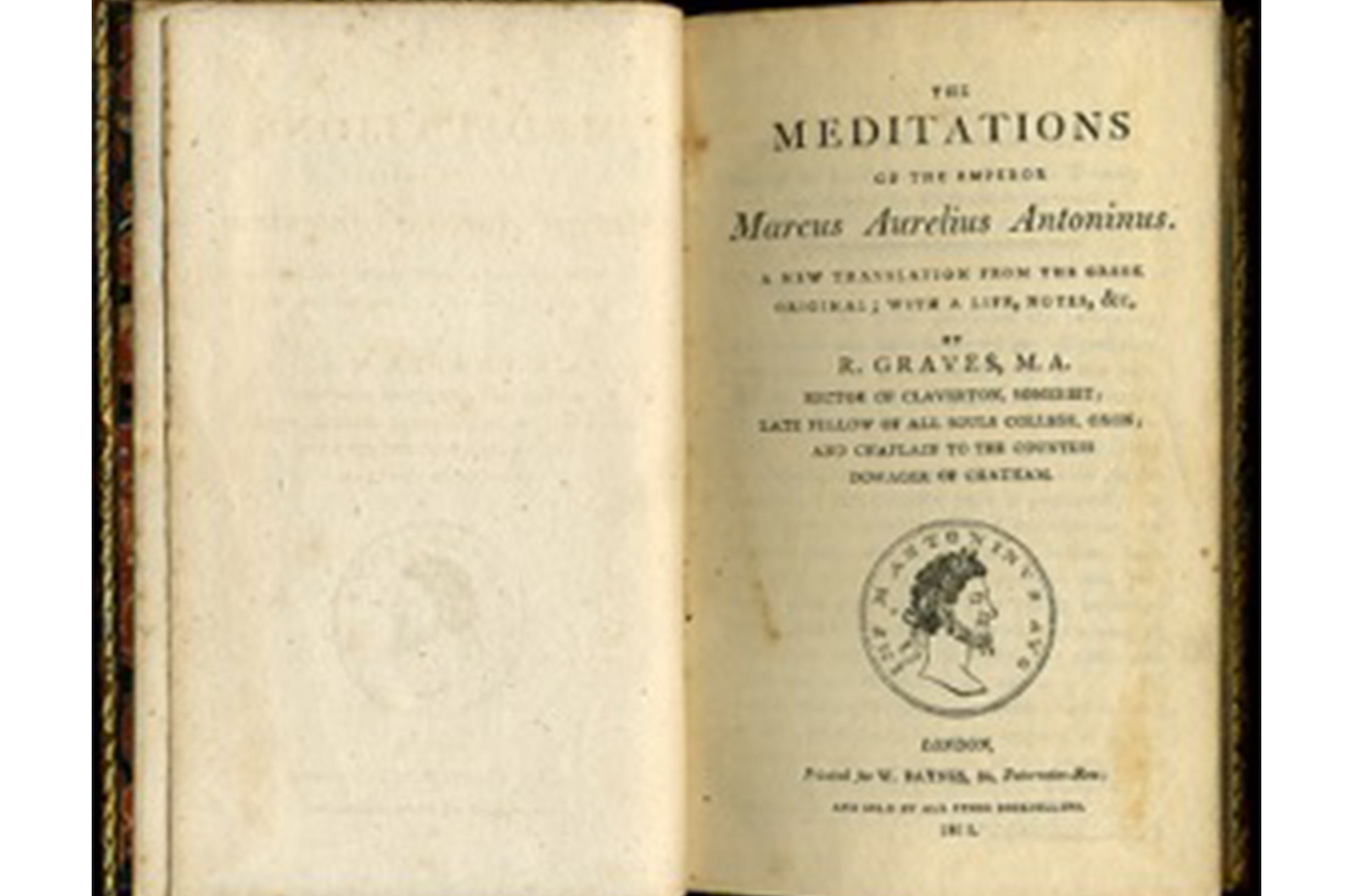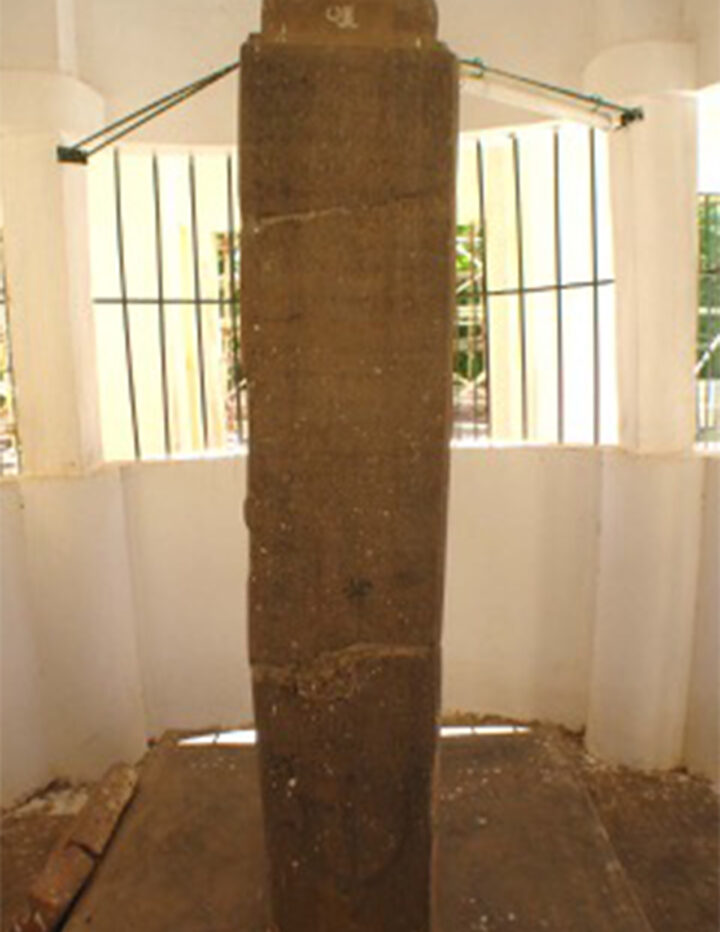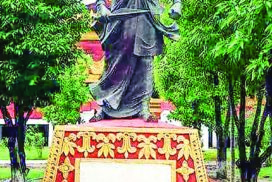According to various sources, the Roman Emperor and one of the few King or Emperor who had written (serious) philosophical work Marcus Aurelius was born on 26 April 121 Current Era: that is 1900 years ago. There was at least one commemorative talk on 26 April 2021 on the 1900th anniversary to the day of Marcus’s birth which can be downloaded from YouTube.
For philosophical aficionados, Marcus’ primary reputation would be based on what can be termed his ‘diary’ which was posthumously given the title Meditations. (Versions of English translations that I have read are by Martin Hammond, Penguin books, first published 2006 and by George Long first published 1862).
Marcus writing his Diary in ancient Greek and hypothetical of King Kyansitthar writing his ‘Diary’ in Mon Language
It is said that Marcus wrote Meditations in the (ancient) Greek language, although he was a Roman. As a person with Burmese heritage, it occurs to me that Marcus’ writing in ancient Greek (online sources say ‘Koine Greek’) can hypothetically only be compared with Myanmar to be more specific Bamar (‘Burman’) King Kyansitthar (1030-1112/1113 Current Era) of the then Pagan (Bagan) kingdom (to repeat hypothetically) writing his ‘diary’ (more than 1100 years after Marcus flourished) in the Mon language instead of Myanmar or Pali language. Burmese (Myanmar) would ostensibly have been the mother tongue of King Kyansitthar, albeit the late historian Dr Than Tun wrote in History of Buddhism in Burma AD 1000 to 1300 that during King Kyansitthar’s time, the Court language was supposedly Mon. King Kyansitthar did construct many stone inscriptions publicly, including the famous Raza Kumara Kyauk Sar (‘Raza Kumara stone Inscription’) in four languages, namely Myanmar, Mon, Pali and Pyu languages. (The Pyus are now extinct both ethnically and linguistically)
We do not know whether or not His Majesty King Kyansitthar wrote ‘a diary’ intended at least initially only for himself. I said this because Marcus did not write his ‘diary’ or Meditations in ancient Latin. Just as Latin was the lingua franca of parts of classical Europe and later medieval and modern-day Christianity, the Pali language was and still is the lingua franca of Southeast Asian Buddhism.
The fact that the Raza Kumara stone Inscription was inscribed in four languages did not necessarily mean that King Kyansitthar or, for that matter, one of his sons Raza Kumara –the Inscription now bears his name- was proficient in Pyu, or Pali languages. (Since, according to Dr Than Tun, the Court language in King Kyansittha’s time was Mon, it may perhaps be presumed that like Marcus, who apparently was bilingual –Latin and ancient Greek- Kyansitthar was also literate in both Myanmar and Mon languages.) The non-Bamar or Myanmar language used in the Inscriptions could have been transcribed by the Buddhist monks (for Pali language) and/or the scribes (for Pyu and probably Mon languages).
A few parts of Burman/ Bamar culture incorporates or is influenced by Mon culture, which geographically lies south of the then Pagan (Bagan) kingdom now in Central Myanmar. Just as Rome was apparently ‘stronger’ militarily than ancient Greece but arguably inferior to Greece culturally, the Burmese or Burmans (Bamars) were militarily stronger than the Mons in the mid-11th century. But the Burmans/Bamars are indebted to Mons for some aspects of their culture. Among others, most historians are of the view that it was from the Mons (south of the then Pagan kingdom) that the Burmans/Bamars were introduced to Theravada Buddhism.
Comparison of Marcus’ Meditations and a few subsequent philosophical work
Marcus did not intend to ‘publish’ or publicize his diary. Some sources said that he specifically ordered his ‘diary’ to be destroyed. If that was the case, posterity should thank the persons who did not obey the Emperor’s orders.
In late 1971, the late Burmese psychiatrist Dr Ne Win suggested to me that I should read Marcus Aurelius’ Meditations (in English translation). Just about forty years later, in late 2011, I bought and read, much belatedly, the Meditations.
I am grateful to Uncle Dr Ne Win for suggesting me to read the book. While he was alive, I did not have the chance to thank him privately, which I publicly do now.
Meditations of Marcus and Confessions of Augustine
I would like to compare Marcus Aurelius’ Meditations with another intellectual biography which was, unlike Marcus’ masterpiece apparently intended to be ‘published’ or publicized. It is Saint Augustine’s (13 November 354-30 August 430) Confessions of a Sinner. (The version of the English translation that I have read is by the late R.S. Pine-Coffin, Penguin Classics).
Augustine’s Confessions which were said to have started to be written when he was 43 years old (around 397 Current Era), and Marcus’ Notes to Himself’ was started to be written when he was about 48 years old (around 170 Current Era). Parts of Augustine’s Confessions ‘provoked’ me (in both the positive and negative sense of the words), and though some of his feelings and confessions are intense, I definitely prefer Meditations to Confessions. (English translation of Meditations can be downloaded for free from particular websites). One also wonders whether Augustine was familiar with or have read Marcus’ work in translation since Marcus died about 250 years before Augustine.
At least some of the passages in the Meditations are moving, intellectually stimulating and to me, at least in the weak sense of both words, spiritually comforting.
Preference for Meditations compared to Plato’s Apology, Crito and Phaedo
This writer does not want to overpraise- but do solidly praise- Marcus Aurelius based exclusively on his writings in the Meditations. I prefer it over Plato’s over-rated Apology, the, in parts, politically distasteful Crito and in parts also almost amusing, phantasmagoric view of the after-life in the long-winded Phaedo. (Parts of Apology, most of Crito and only about 1/10 or less of Phaedo were translated into Burmese – from the English translation by Benjamin Jowett- by the late Saya Zawgyi in Pa lay Toe Ni Dan ပလေတိုးနိဒါန်း(‘Introduction to Plato’) (1st edition 1969).
Meditations preferred compared to Pascal’s Pensees and Freud’s Civilization and its Discontents
I would like to briefly mention, in brief juxtaposition, the work of two random writers who flourished centuries after Marcus Aurelius. They are Sigmund Freud’s (in this writer’s view) over-rated Civilization and its Discontents and Blaise Pascal’s Pensees (‘Thoughts’), both of which I have read in English translations.
Pascal’s work, roughly the same length as Meditations, was first published in the original French around 1670, roughly about 110 years after the first publication in Latin translation of Meditations in 1558. The first English translation of Meditations appear in 1792, and it was republished in 1811.
In my (surely) partisan view, both Pascal’s and Freud’s books stated above somewhat pale in comparison with Meditations. Even if that is not the case, at least Marcus’ Meditations are to quote and translate from the late Burmese author Bhamo Tin Aung (9 June 1920-23 October 1978) he often used in his Burmese language books ‘is a head above’ in Myanmar Gaung Ta Lone Thar ခေါင်းတစ်လုံးသာ the two works of the said 17th and 20th-century writers.
Pascal’s Pensees (‘Thoughts’) is like Augustine’s Confessions, intense in many parts but perhaps equally if not even more polemical than it (from my memory of what I read over 37 years ago in 1983). Some philosophers have critiqued Meditations as being ‘unsystematic’. Marcus did not intend to publish his diary in contrast to Pascal and Freud’s ‘musings’ in their two books mentioned above. Unsystematic may be, but Meditations is still a superb work which at least in parts is inspiring in its sincerity, humanity and depth of introspection. And it bears repetition: Marcus did not intend others to read and comment on his work more than eighteen millennia after his death.
Marcus’ ‘various hats’ and being less innocent than the earlier philosopher Epicurus and later philosopher Spinoza
Marcus is not always praised (far less universally praised) as a philosopher, warrior and Emperor. As an Emperor and warrior (though by no means a despot), he almost certainly would have ‘blood on his hands’. This would not have been the case with philosophers like, say, one of his predecessors, the ancient Greek philosopher Epicurus (341 -270 Before the Current Era), who died 450 years before Marcus. Epicurus espoused a different philosophy (Epicureanism) from that of Marcus (Stoicism).
And it would be churlish to state that the 17th-century Dutch philosopher Baruch Spinoza (24 November 1632-21 February 1677) was a persecutor of any person during his short life.
Alas, at least to some, Marcus, in terms of persecuting and causing the deaths directly or indirectly of his fellow humans, could or would not have been as innocent as either Epicurus or Spinoza. Both of these earlier and later philosophers have great admirers and also mainly in the past severe critics of their philosophies and their personal lives. Epicurus and Spinoza would not have authorized the killings or caused the killings, in war, or indeed during peacetime, which Marcus in his ‘warrior hat’ would or at least could have done so.
Sources mentioned that during his reign, Marcus persecuted Christians. One contemporaneous Christian commentator apparently had stated that the day of Marcus’ death was ‘a great day for Christianity’.
Marcus disdaining fame and a query regarding full Myanmar translation of Meditations
In quite a few passages from his diary, thankfully preserved throughout all these centuries, the Emperor-warrior-philosopher expressed his (genuine) disdain for fame, including (his) posthumous fame.
Notwithstanding this disdain or equanimity about his fame, Marcus Aurelius’ fame throughout the centuries is established. This is largely due to his Meditations which reflects his inner struggles, internal conversations and ‘overhearing’, including doubts, insights and his philosophical stoicism.
The Meditations have touched (in the non—theological sense of the words) many persons for a good part of a thousand years. Hence this commemoration and tribute of Marcus Aurelius’ work Meditations on the 1900th anniversary of his birth.
(The writer is not aware of full translation into Burmese of Marcus’ Meditations. If this has been done, he would be grateful if knowledgeable persons can inform him. The writer recalls that the veteran translator and politician, the late Sayagyi Thakin Ba Thaung mentioned Meditations in one of his writings in Burmese, but to the best of this writer’s knowledge, Marcus’ philosophical diary has not been translated in full into Burmese.)
Dr Myint Zan, a retired Professor of Law, has endowed funds at one of his alma maters, the Australian National University (ANU), for the academic years 2018 to 2020, the Myint Zan Fellowship in Philosophy (for early career researchers) and in perpetuity, Myint Zan Prize in Philosophy of Science (for undergraduate philosophy majors) at the Department of Philosophy. Three inaugural Myint Zan Philosophy Fellowship recipients had visited the ANU Department of Philosophy for a few months in 2019 and 2020. The inaugural Myint Zan Philosophy of Science Prize has been awarded to an undergraduate philosophy student in February 2020.














